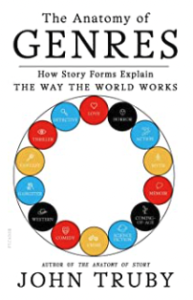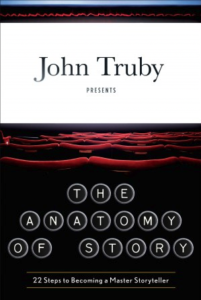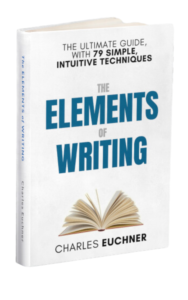This is the first part of a two-part interview with film guru John Truby. You can read the second part here.
The idea of genre can be a touchy topic among writers.
“Don’t classify me, read me,” Carlos Fuentes groused. “I’m a writer, not a genre.”
 Genre refers to a type of story–the kinds of characters, problems, places, and conflict you can expect to encounter. People look for different things in stories–and when they don’t find it, they get angry. In that sense (like a brand in business), a genre is a promise. When you buy a detective story, you expect to see a smart loner systematically figure out who had the motive, means, and opportunity to commit a crime–confronted by a cunning opponent who matches him at every turn, until the very end.
Genre refers to a type of story–the kinds of characters, problems, places, and conflict you can expect to encounter. People look for different things in stories–and when they don’t find it, they get angry. In that sense (like a brand in business), a genre is a promise. When you buy a detective story, you expect to see a smart loner systematically figure out who had the motive, means, and opportunity to commit a crime–confronted by a cunning opponent who matches him at every turn, until the very end.
 But as John Truby says in his brilliant new book, The Anatomy of Genres, a genre is not just a familiar way of living in the world of stories. It is a system. Any system–from the biological system of the body or the internal combustion engine of a car–succeeds only when each of its component parts performs its job and contributes to the larger process in a reliable way.
But as John Truby says in his brilliant new book, The Anatomy of Genres, a genre is not just a familiar way of living in the world of stories. It is a system. Any system–from the biological system of the body or the internal combustion engine of a car–succeeds only when each of its component parts performs its job and contributes to the larger process in a reliable way.
(To purchase The Anatomy of Genres, go to anatomyofgenres.com. For story courses and story software, go to truby.com.)
Truby lists 14 genres, in the following order: Horror, Action, Myth, Memoir, Coming of Age, Science Fiction, Crime, Comedy, Western, Gangster, Fantasy, Thriller, Detective, and Love Story. They move from the most primal issue (death) to the most transcendent (connection).
Truby offers two essential rules for genre writing:
- Each story must use 15 to 20 specific beats, or plot events, that fit its genre. When they’re missing, the reader senses a kind of void. Storytellers who think they can reinvent narrative–who resist the conventions of genre–are in for a rude awakening. You need to deliver what people expect when they pick a story. (For an overview of the beats in all genres, go here.)
- Every story needs to transcend its genre by offering something unpredictable and by using two or three other genres in supporting roles. A Sci Fi story can have elements of the Myth and Love Story genres, for example. Why the need for multiple genres? Modern people are surrounded by stories and get bored with overly familiar genre techniques. They need something extra to spritz the experience.
Truby’s work is primarily a guide for storytellers. But it is also a rumination of the role of stories in human life. Stories are not just accounts of people (or other creatures) doing things in an entertaining and meaningful way. Stories don’t just help us to “make sense” of life; they are not, as Joan Didion once said, “the imposition of a narrative line upon disparate images” we experience in life. Stories are not just about life; they are life. We could no more “separate” ourselves from the stories we tell and consume than we could separate the heart or the lungs from the body.
Why does that matter? Because the truest stories don’t just follow genre conventions. They tap something ineffable about human experience. That, ironically, is why the conventions matter so much. When we get them right, we are now free to discover the truths that lie deep in our minds and hearts and to somehow get them onto paper. Rules don’t restrict creativity but enable it.
To explore these issues, I talked with John Truby about his new book. An edited transcript of our talk follows.
How did The Anatomy of Genres come about?
I have taught writers for over 30 years. At times, when I talk with writers about what I do, they say, “I know all about story because I use the three-act structure or The Hero’s Journey or Save the Cat and they think that’s all they need. These approaches are fine for beginners, but they have very few practical story techniques—and almost nothing that can tell you how to write at the professional level. We’re talking about being in the top 1 percent of writers.
For me, genres are the highest form of knowledge because they tell us how the human mind works.
 When I wrote my first book, The Anatomy of Story, my goal was to include all the professional story techniques a writer would need to write a bestselling novel or a hit screenplay. But the one subject it does not cover, which is the key to writing a hit film or novel, is how to write the different genres that make up 99 percent of popular storytelling today.
When I wrote my first book, The Anatomy of Story, my goal was to include all the professional story techniques a writer would need to write a bestselling novel or a hit screenplay. But the one subject it does not cover, which is the key to writing a hit film or novel, is how to write the different genres that make up 99 percent of popular storytelling today.
What about genres that makes them so important?
The answer is expressed in the subtitle: How Story Forms Explain the Way the World Works. We typically say that humans tell stories, but I believe it’s much deeper than that. Humans are stories. From birth, our mind creates our first story, and it’s the story of me. And from then on, everything I see and understand is a form of story.
Genres are different types of stories. Therefore, each genre gives us a different portal into how the world works and a different recipe for how to live successfully. For example, Horror says we live our best life when we confront our death and make amends for our sins. Fantasy says we succeed by making life itself a work of art. Each of the 14 major genres has a different approach to how to live.
If you want to be a successful storyteller, you have to express the deeper life philosophy through the plot of that genre. And frankly, most writers don’t do that.
Is it safe to say that the fundamental human problem is that we’re all going to die? Do the genres simply have a different answer to that question?
Absolutely. Horror is the first genre I explore because it deals with that question directly. It’s about how do you face your own inevitable demise. That’s something that nobody wants to face. In fact, nobody really believes it’s going to happen to them. All genres are about how to live a good life in this limited time that we have. Each genre gives a different recipe for how to do that: You will live a fulfilling life if you do X.
The genres each look at different aspects of life. Together, they add up to a comprehensive approach to understanding life.
All 14 genres not only have a very powerful and valid life philosophy; all of them are necessary for a fully rich life.
If you sequence the genres in a certain way, you get a kind of ladder of enlightenment. That’s why I start with Horror and Action at the base level and then move all the way up to the highest levels, which are Fantasy, Detective, and Love.
You could make a parallel with genres and archetypes. Archetypes show the different kinds of people in the world—and they reflect the tendencies that we all have within our own selves.
That’s absolutely right. But genres are much bigger than archetypes in terms of what they pull together into one system. The power of genres comes from the fact that they are based on the major activities of life. For example, Crime is about morality. The Gangster story is about business and politics. Memoir is about creating the self. Fantasy is about the art of living. Love is about how to live a happy life. The question is, how will we do that?
Tolstoy asked: “How, then, shall we live?” Each genre answers that question in a different way.
Exactly. And, you know, it is part of how I wrote each genre chapter. At the beginning of each chapter, I talk about each genre’s mind/action view. By that I mean, each genre expresses a unique way of thinking about the world, and each one shows how to have success, and that is the genre’s theme. Each genre combines the action side and the mind side. That makes it all-encompassing in terms of how to live.
So what are these genres about more specifically?
Horror is really about religion. Action is about success. Myth covers the life process. Memoir and Coming of Age are about creating the self. Science Fiction is about science, society, and culture—that’s why it has the biggest scope of all the genres. Crime is about morality and justice. Comedy is about manners and morals. The Western is about the rise and fall of civilization. Gangster is about the corruption of business and politics. Fantasy is the art of living. Detective and Thriller are about the mind and truth. And Love is about the art of happiness.
You don’t get any deeper or more expansive than that. And when you put all those together, you cover everything human beings do.
What makes a story unique, within the boundaries of a genre?
It means executing the individual beats in a way that we haven’t seen before. More importantly, it means expressing the life philosophy through the plot beats. And that’s the area where writers go wrong. The most underestimated element of storytelling is theme. Writers are terrified of theme. They’ve heard the old rule that if you want to send a message send it Western Union. So, to avoid hitting the theme on the nose they avoid theme entirely. It’s one of the biggest mistakes you can make. You need to express theme under the surface, through the structure, through the plot beats. If you’re not expressing the life philosophy of that genre, you’re getting one-tenth of the power of your story.
Do you have any favorite genres?
I love all these genres. In writing this book, I gained tremendous love and respect for the genres that I didn’t really care about. Each genre gives you this portal to different activities of life. But even though I love all the genres, the ones that I love the most are the Western and the gangster.
The Western is about the rise of the American Dream and Gangster is about the corruption of the American Dream. The Western is completely inaccurate historically, but it’s not about real history. It’s the American Creation Myth. The Gangster is the best expression of how the real world works now because it focuses on the corruption of business and politics.
The Gangster form is the closest genre to the Great American Novel, which explores how America has failed to meet the ideals expressed in its creation documents, the Declaration of Independence and the Constitution. The Great Gatsby is a transcendent Gangster story. Mad Men is basically a modern-day Great Gatsby. Both main characters create a new identity from a lie. They both express the basic American ethic that you can be whoever you want to be.
Mad Men, by the way, is one of the five best TV dramas ever made—just a massive work of art, one of the great American epics ever written.
Mad Men’s first episode tells you everything you’re going to experience in the show. Matthew Weiner knew where he was going to go. He knew the final scene of the series the whole time.
That’s one of the keys to writing a transcendent work in TV—having a sense of the overall track of the main character’s development from the very beginning. Breaking Bad was the same way.
So your two favorite genres are the Western and Gangster. They both explore the American Dream. If you were French, would they still be your favorite genres?
I grew up with the Western, which expressed that whole conception of the American ethic, which is incredibly positive and empowering. When I was a teenager, I encountered the four great anti-Westerns: The Wild Bunch, McCabe and Mrs. Miller, Butch Cassidy and the Sundance Kid, and Once Upon a Time in the West. They are the Gangster versions of the Western. They are about the fall of the American Dream.
Seeing these films was a major turning point in terms of my understanding of the potential, the philosophical power, you could have from a Hollywood feature film.
So, shifting focus, I was wondering if you ever feel “storied out.”
It’s just the opposite. When I watch a movie, I am absolutely entranced—unless the writer screws up. That’s what breaks my suspension of disbelief. And then you’re out of the story. But when I see great storytelling, it’s a totally enriching experience. I’m fascinated by the techniques the writer used to get those effects and how they applied the technique to their particular story problem. And then how that illuminates the way life works and how the human mind tries to make its way within it.
I sometimes liken it to sports. Let’s say you watch football. If you don’t know much about football, it just looks like a mass of bodies jammed together, and they just do that up and down the field. That’s boring. But if you know what’s happening, you are literally able to see the details as they happen. You can see, oh, that right guard is pulling, the defensive end did a trick maneuver to get to the quarterback, et cetera. You get into what’s happening structurally, under the surface.
This is why my approach to story has always been about structure. What’s most fascinating is there’s the surface of what’s happening and there’s the deep structure of what’s really happening and why. It’s getting to the deep causes that I find absolutely fascinating. And the reasons for it happening are often very different than we really think.
Can I ask about our current political situation? We have all these performance artists running around, lying, avoiding issues, breaking the law. It’s really the Gangster stage of our development. And a lot of what these gangsters and liars are doing is creating fake stories. So the key thing about being able to put on your story analysis hat is that you’re able to see through that.
With the rise of information technology, the ability to divide image from reality has never been greater—which means the ability to lie has never been greater.
So how do you deal with it? What genre can help us to separate truth from lies?
To me it’s the Detective story. It’s about asking questions, looking at evidence and using methodology. We can never get the whole truth. But you can get to some degree of truth that is not a complete fabrication. And that’s why the detective form is so valuable. I consider it the most important modern genre. Few of us are action heroes. But we can all learn how to look for the truth. The detective story tells us how. Science itself is a detective story.
Robert Caro, the great biographer of Robert Moses and Lyndon Johnson, once said something to the effect of, “I don’t know what truth is but I do know what facts are. And facts can add up to some amazing insights.”
And it is something that everybody is responsible for. I don’t think people take nearly as much responsibility for it as they should. If we don’t do it, the larger system is going to collapse.
If we don’t take control of the detective narrative, if we don’t play our parts, so to speak, then you’re going to let the bad guys write their own horror stories, gangster stories, action stories and myths.
With the possible exception of the Love story, there’s no story form more important to our success, not to mention survival, than the Detective story.
We all have stories of our own lives and those stories are usually wrong. So the key, whether you’re a storyteller or reader or just a person trying to lead a decent life, is developing the ability to reject the stories that don’t actually pan out.
That’s what the Memoir genre does. In a memoir, you look back and see the story you created for yourself to help you survive. But those stories were full of errors. You created them when you were young. Or you were given them and you bought into it because it came from dad. So the great question of memoir is: How do you create a new story that allows you to have a better life in the future?
This is the first part of a two-part interview with film guru John Truby. You can read the second part here.


